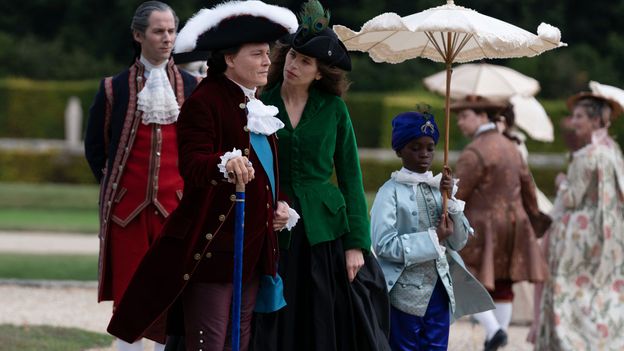Johnny Depp’s comeback is a flop


Johnny Depp used to be Hollywood royalty: if he wasn’t quite the king of the US film industry, he was certainly one of its dashing princes. But his crown has slipped. Following his much-publicised legal battles with his ex-wife, Amber Heard, Hollywood may be more reticent to cast him in blockbusters these days. But they do things differently in France. Not only did Maïwenn pick Depp to play Louis XV in her costume drama, Jeanne du Barry, but the film was picked to open this year’s Cannes Film Festival. It was a controversial choice – and that was even before Maiwenn was sued by a magazine editor for assault. If the Festival’s organisers wanted to declare that they didn’t care about popular opinion, this was certainly one way to do it.
More like this:
– 12 of the best films so far in 2023
– Why are blockbusters badly-lit?
– The movies too bad for the cinema
It’s a shame that the film itself is so unremarkable. As well as directing and co-writing it, Maïwenn stars as Jeanne Bécu, a woman from a humble background who became the king’s favoured mistress in the 1760s. It’s the kind of story which has been told with revisionist, feminist pizzazz in Sofa Coppola’s Marie Antoinette, Yorgos Lanthimos’s The Favourite, and Marie Kreutzer’s Corsage, but Maïwenn has opted for a more traditional, stolid approach that lacks both waspish wit and earthy authenticity. She takes us methodically through the key episodes in Bécu’s rags-to-riches life, but leaves a narrator to describe most of the dramatic moments. The palaces, frocks and metre-high wigs are suitably fabulous, but not in a way you haven’t seen a hundred times before.
It’s disappointing, because there are signs early on that the film might have a more mischievous spirit. Bécu is shown as a girl who is kicked out of a convent for reading racy books, and then she is shown again as a young woman who moves to Paris and establishes herself as a sought-after courtesan, with the help of her aristocratic pimp, Le Comte du Barry (Melvil Poupaud). He arranges for her to meet the king, whereupon she casually submits to a gynaecological exam by the royal medics, and giggles at the palace protocol taught to her by a strict but sweetly patient major-domo (Benjamin Lavernhe): no one is allowed to turn away from His Majesty when they leave a room, he explains, so they have to click-clack backwards in tiny, shuffling steps.
In these introductory scenes, Depp’s casting suddenly makes perfect sense. Here is someone who knows what it is like to have obscene wealth, and an entourage of lackeys who cater to his every whim, but never give him a moment’s peace. With a charming half smile and a roll of his eyes, he shows us how bored Louis is with the rigmarole, and we can see why he might be drawn to the irreverent Jeanne. Unfortunately, her irreverence doesn’t last. Once she is installed in the Palace of Versailles, Louis’s grown-up daughters (caricatured as the ugly sisters from Cinderella) are scandalised that a commoner should be swanning around. But her radicalising influence amounts to … errrr … starting a fashion for wearing stripy dresses.
Jeanne Du Barry
Directed by: Maiwenn
Starring: Maïwenn, Johnny Depp, Melvil Poupaud
Length: 1 hr 56 minutes
It’s a weirdly conservative and royalist enterprise. Both Jeanne and the film as a whole admire Louis unconditionally, forgiving him for having a production line of mistresses, for instance, and for giving her an African boy as a present, as if he were a pet. This indulgence may well be historically accurate, but it leaves the heroine coming across as a doormat with no agenda or desires of her own beyond hanging onto her position as the king’s kept woman. Nor can we buy into the conceit that theirs is a love story for the ages, because there isn’t enough chemistry between the two lead actors. Maïwenn doesn’t have the magnetism required for the part – it’s unlikely she would have been cast if she wasn’t the director – and Depp is subdued to the point where he’s barely conscious. It’s refreshing to see a reserved, understated performance from him for a change, but he hardly seems like a man in the throes of a life-changing passion. Considering the risqué subject matter, the film is awfully coy about what Jeanne might do to make him so fond of her, too.
It’s worth remembering that the last time the Cannes Festival opened with a biographical drama about European royalty, it was Grace of Monaco, and Jeanne du Barry is nowhere near as bad as that was. It’s a respectable, watchable, mild-mannered soap opera, and if you’re a fan of horse-drawn carriages and gilded apartments, then you could do worse. But you could also do quite a lot better. The combination of Depp and Maïwenn may have seemed like a dangerous one, but on this occasion they’re playing it safe.
★★☆☆☆
Love film and TV? Join BBC Culture Film and TV Club on Facebook, a community for cinephiles all over the world.
If you would like to comment on this story or anything else you have seen on BBC Culture, head over to our Facebook page or message us on Twitter.
And if you liked this story, sign up for the weekly bbc.com features newsletter, called The Essential List. A handpicked selection of stories from BBC Future, Culture, Worklife and Travel, delivered to your inbox every Friday.








